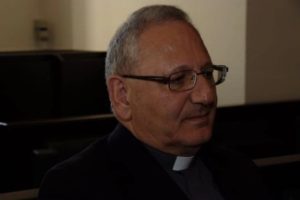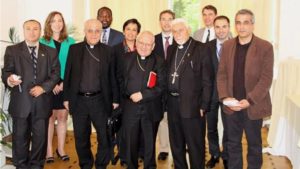Photo: Rayan al-Kildani used on social media a picture with the Pope taken during a general audience to falsely imply that he had a private audience with the Pontiff.
IRAQ: Beware of Rayan al-Kildani and his “Christian” Babylon Movement
The Vatican and the Chaldean Patriarch stated that the controversial politicians, sanctioned by the U.S. for his human rights abuses, cannot speak for the Iraqi Catholic community.
by Willy Fautré
 Bitter Winter (27.09.2023) – The leader of a Christian political party and an armed militia claiming to be the voice of the Christian community in Iraq falsely declared to have been invited for a meeting with the Pope at the Vatican.
Bitter Winter (27.09.2023) – The leader of a Christian political party and an armed militia claiming to be the voice of the Christian community in Iraq falsely declared to have been invited for a meeting with the Pope at the Vatican.
On 7 September, the media office of Rayan al-Kildani, sanctioned in the United States for egregious violations of human rights in Iraq, claimed that he privately met the Pope in the Vatican, and “conveyed him the greetings of the Iraqi government and the Iraqi people, asking him for his prayers for Iraq.”
The Washington Institute for Near East Policy debunked this fake news in a paper titled “Rayan al-Kildani Pretends to Have a Personal Audience with the Pope,” giving evidence that the framing of the meeting was deceptive. The media office press release of Rayan al-Kildani and photos showing him near the Pope wanted to give the impression that it was a private audience with the Pope.
In a communication to journalists, the Vatican subsequently rectified the facts saying the Pope had met in a General Audience “a group of Iraqis, which included Mr. Rayan al-Kildani, with whom some brief words were exchanged.”
In April 2023, al-Kildani had already tried to get a private audience but his request had been dismissed. He also failed to get a personal meeting with the Pope when Francis visited Iraq in 2021.
Rayan al-Kildani is an Iraqi politician born into a Christian Chaldean family in Alqosh on 3 September 1989 in Iraq. Later on, he moved to Baghdad. He is the head of the Babylon Movement, a political party self-identifying as Christian, and the commander of a Christian armed militia.
In 2014, after the ISIS occupation of parts of the Middle East, he created the Babylon Movement, which claims to be close to the Catholic Chaldean Church but is rejected by Cardinal Louis Raphael Sako, the head (Patriarch) of the Chaldean Catholic Church. Its declared objective was to resist the Islamic State group in northern Iraq. Since then the Babylon Movement has become an economic and political force to reckon with.
On this issue, the Chaldean Catholic Church, which is in full communion with the Holy See, issued a statement confirming that it has nothing to do with Rayan al-Kaldani, who claims to represent the Catholic community.
The relations between al-Kildani and Cardinal Sako have been very tense for years as the Catholic prelate is an obstacle to his political ambitions. The controversial political leader does not refrain from spreading disparaging rumors against the cardinal and accusing him of corruption. He also took sides with President Abdul Latif Rashid when on 3 July 2023 he revoked a special presidential decree issued in 2013 by former President Jalal Talabani that granted Cardinal Sako powers to administer Chaldean endowment affairs and officially recognized him as the head of the Chaldean Catholic Church.
According to Kurdish media outlet Rudaw, “the President’s decision came amid mounting pressure from Rayan al-Kildani, the leader of the Christian Babylon Movement, a party and militia affiliated with the pro-Iran Popular Mobilization Forces.” At a webinar for journalists organized by L’Oeuvre d’Orient on 19 September, Cardinal Sako declared that he had appealed the presidential decision and the case was to be examined by the Supreme Court.
Some current and former Christian members of the Iraqi Parliament, including Imad Youkhana and Yonadam Kanna, two Assyrian politicians, also stated that Rayan al-Kaldani, his political party and his armed militia cannot claim to represent Christians.
According to the commander of the Syriac Lions Battalions (SLB) and Syriac Hawks Forces (SHF), two other Christian militias, al-Kildani grew up in poverty and never finished primary school. He converted to Shia Islam when he got married, an obligation for a religiously mixed marriage, but he continued to present himself as a Chaldean Christian, because this made him a useful political asset to other political forces.
Even if he politically identifies himself as a Christian, there is no trace of his participation in church life and, as a politician, no record of any relations with his own community. He has however nurtured privileged relations with Shia actors.
Al-Kildani opposed the creation of a self-ruled political entity in the Nineveh Plain, one of the mainly and historically Christian populated regions of Iraq. He consistently expressed support for Iran-backed actors across the Middle East and Iranian policies while openly taking sides against the Kurdish Regional Government (KRG), the international coalition, and Saudi Arabia.
In 2014, the year of its foundation, the Babylon Movement participated in the parliamentary elections but did not get any seat. In 2018, it got two seats while the Chaldean List got one and the Chaldean Syriac Assyrian Popular Council one.
In the 2021 parliamentary elections, four candidates of the Babylon Movement, two men and two women, won four of the five seats reserved to Christian parties out of 329 in the parliament.
In Iraq, eight seats are reserved for minority groups: five for Christians, and one each for Mandeans, Yezidis and Shabaks. Most Christians in Iraq belong traditionally to the Syriac Orthodox Church, the Chaldean Catholic Church, and the Assyrian Church of the East. They are concentrated in small cities in the Nineveh Plains, such as Alqosh, Tel Keppe, Ankawa, and Bartella.
With the massive exodus of Christian Iraqis after the fall of Saddam Hussein and with the war against ISIS, the Christian population has collapsed from 800,000 to 200,000 in the last twenty years. In the various regions of the country, the number of Christian voters has dramatically decreased, and they are now increasingly diluted among growing Muslim populations in their historical governorates, Baghdad, Duhok, Erbil, Kirkuk, and Nineveh.
Moreover, the fragmentation of the Christian political landscape has further aggravated their political weakness. Last but not least, the practice of “buying votes” from non-Christian Iraqis in the minority quota system is more and more widespread and sophisticated.
In 2009, any Iraqi was allowed for the first time to vote for the designated minority seats—unlike in 1992 (when Assyrians in the Kurdistan Region of Iraq voted in special boxes), or in 2005 (when there were no quota seats). Since fewer votes were needed to gain a quota seat, larger parties could instruct their own non-Assyrian supporters to vote for an Assyrian ally—in exchange for compliance from the latter’s elected representatives on a number of issues.
The Kurdistan Democratic Party mobilized votes in this manner for the Chaldean Syriac Assyrian Popular Council, the Patriotic Union for Kurdistan for the Assyrian Democratic Movement and Shia Arab parties for the Babylon Movement. Iraqi Communist Party politicians themselves admitted they had won a quota seat for an Assyrian electoral list with the help of non-Assyrian Communists.
This practice has led to the subservience of the surviving but skeletal Christian parties.
Behind this broad political painting of the Christian minority in Iraq, it is worth noting that on 18 July 2019, the U.S. Department of the Treasury’s Office of Foreign Assets Control (OFAC) designated Rayan al-Kildani for sanctions based on the Global Magnitsky Human Rights Accountability Act and targeting perpetrators of serious human rights abuse and corruption.
Rayan al-Kildani is held accountable for serious human rights abuse, including persecution of religious minorities and torture, illegal land seizures in the Nineveh Governorate, exploitation of his public position to line his pockets and hoarding power at the expense of Iraqi citizens.
Photo above: Cardinal Sako. Credit: Nail Beth Kinné, Human Rights Without Frontiers.

Photo: Cardinal Sako during his visit to Brussels several years ago. Credit: Nail Beth Kinné, Human Rights Without Frontiers.
